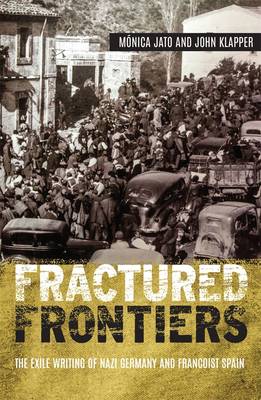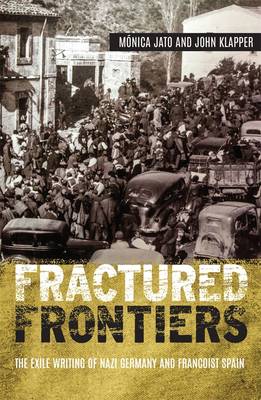
En raison d'une grêve chez bpost, votre commande pourrait être retardée. Vous avez besoin d’un livre rapidement ? Nos magasins vous accueillent à bras ouverts !
- Retrait gratuit dans votre magasin Club
- 7.000.000 titres dans notre catalogue
- Payer en toute sécurité
- Toujours un magasin près de chez vous
En raison de la grêve chez bpost, votre commande pourrait être retardée. Vous avez besoin d’un livre rapidement ? Nos magasins vous accueillent à bras ouverts !
- Retrait gratuit dans votre magasin Club
- 7.000.0000 titres dans notre catalogue
- Payer en toute sécurité
- Toujours un magasin près de chez vous
Fractured Frontiers
The Exile Writing of Nazi Germany and Francoist Spain
Monica Jato, Mónica Jato, John Klapper
Livre relié | Anglais
209,45 €
+ 418 points
Description
A comparative study of "inner" and "territorial" forms of literary exile under Nazism and Francoism, proposing an integrative model of exile that emphasizes common approaches and themes rather than division.
Writers opposed to National Socialism or Francoism have been considered either territorial exiles, who left their country, or "inner exiles," who did not. Those who stayed were initially accorded greater status, while those who left were denigrated. With time, however, there was a growing recognition of the hardship and achievements of territorial exiles and increasing criticism of inner exiles. Later critical debates have perpetuated this fissure and failed to explore the similar origins and assumptions of the two forms of exile.
This book adopts a unique cross-cultural approach, illuminating the shared roots of opposition across the two cultures and exilic settings. It challenges the traditional divide, demonstrating striking similarities in terminology, exilic identities, and literary concerns, between not only "inner" and "outer" but also the German and Spanish contexts. The study offers new perspectives on the literary historiography of twentieth-century Germany and Spain, showing how, in the impact and consequences of dictatorship, the histories of the two countries intersect. It is thus of interest to literary historiansand students of German and Spanish literature, and it also, because it provides English translations of all quotations, serves as an introduction for English-speaking readers to this poorly understood phenomenon and its implications for other exilic settings. Mónica Jato is Reader and John Klapper is Emeritus Professor in the Department of Modern Languages, University of Birmingham, UK.
Writers opposed to National Socialism or Francoism have been considered either territorial exiles, who left their country, or "inner exiles," who did not. Those who stayed were initially accorded greater status, while those who left were denigrated. With time, however, there was a growing recognition of the hardship and achievements of territorial exiles and increasing criticism of inner exiles. Later critical debates have perpetuated this fissure and failed to explore the similar origins and assumptions of the two forms of exile.
This book adopts a unique cross-cultural approach, illuminating the shared roots of opposition across the two cultures and exilic settings. It challenges the traditional divide, demonstrating striking similarities in terminology, exilic identities, and literary concerns, between not only "inner" and "outer" but also the German and Spanish contexts. The study offers new perspectives on the literary historiography of twentieth-century Germany and Spain, showing how, in the impact and consequences of dictatorship, the histories of the two countries intersect. It is thus of interest to literary historiansand students of German and Spanish literature, and it also, because it provides English translations of all quotations, serves as an introduction for English-speaking readers to this poorly understood phenomenon and its implications for other exilic settings. Mónica Jato is Reader and John Klapper is Emeritus Professor in the Department of Modern Languages, University of Birmingham, UK.
Spécifications
Parties prenantes
- Auteur(s) :
- Editeur:
Contenu
- Nombre de pages :
- 304
- Langue:
- Anglais
Caractéristiques
- EAN:
- 9781640140516
- Date de parution :
- 25-06-20
- Format:
- Livre relié
- Format numérique:
- Genaaid
- Dimensions :
- 152 mm x 229 mm
- Poids :
- 576 g

Les avis
Nous publions uniquement les avis qui respectent les conditions requises. Consultez nos conditions pour les avis.






